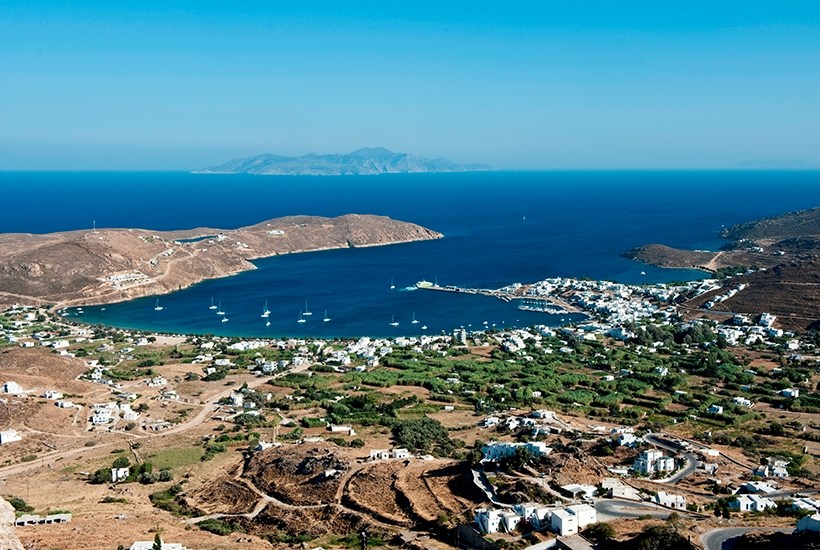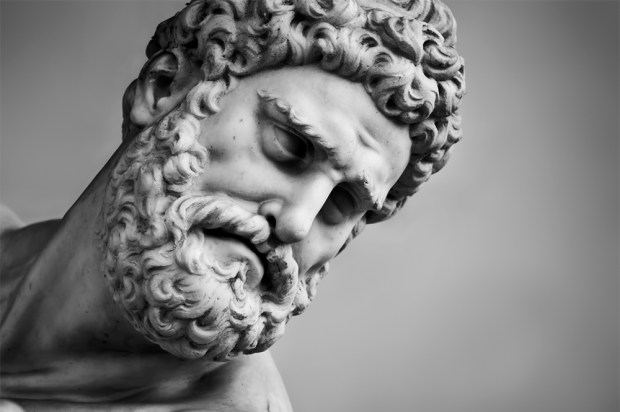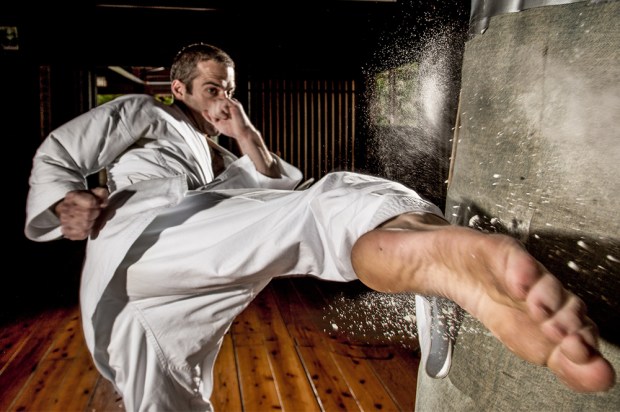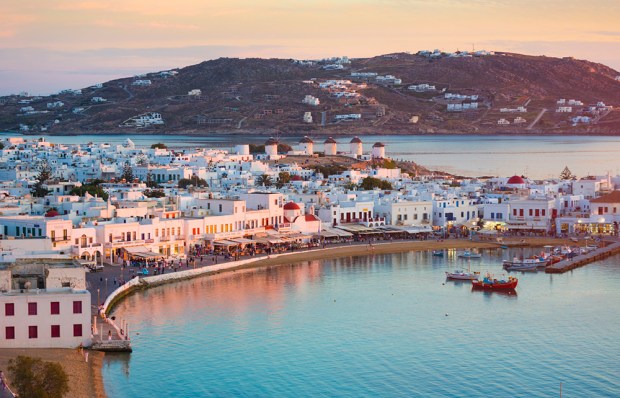Island of Serifos
Let’s get one thing straight: island life is not for me. Island life off a boat, jawohl, but island life without a boat, nyet! Family czars insisted that living in tight quarters with Covid-ignoring sex-starved sailors would not be conducive to the health of my four grandchildren. Better safe than sorry and all that, but from now on, Covid-carrying and sex-starved or not, I’m spending my summers in the company of sailors going from isle to isle like a drunken Flying Dutchman.
Serifos is an island in the western Cyclades that once upon a time was a place of exiles. Roman emperors banished criminals there, probably because it’s windswept, poor and insignificant. By the time iron and copper were discovered, Nero and Caligula were long gone, though striking Greek miners were nevertheless shot dead by the fuzz back in 1916. Those were the days, when civil disobedience did not make you a celebrity but got you a ‘gabardine en sapin’, as the Frogs call a wooden box. And speaking of frogs, Serifos is full of them but they are mute. No one has as yet explained why, but something awful must have taken place to shock them into silence. Maybe Perseus was washed ashore in mythological times, and then returned with the Gorgon Medusa’s head, scaring the crap out of everyone, including the frogs.
The population of the island is just over 1,000 and the natives are friendly because of the lack of rich tourists. The place is arid and windswept and there are no slaves to designer labels, most of tourists being backpackers and the young. Unlike neighbouring Sifnos, which is drenched in mimosa and bougainvillea, Serifos has only some olive trees and a lot of cactuses. It sounds ritzy-glitzy, but I hadn’t visited a public beach in 50 years, and the experience did not leave me traumatised for life. The wind was blowing a storm, sand turned Antonius and Theodora into Bedouin children, and the only safe place was underwater, in the clearest sea this side of Patmos. Despite this, there were no lifeguards to whistle people back, no shark warnings, no one telling swimmers to get back or else. Everyone did whatever they felt like doing. Some young women called my 18-month-old grandson ‘Angeloudi’. It means little angel, and I don’t blame them: he was the only very blond, naked cherub on the beach, and he looked as if he had been stripped off the ceiling of some Italian cathedral. Greeks are very nice with children, and they went overboard when they found a tiny naked blond thing waddling around. In America, they would have probably arrested him for indecent exposure.
The difference is that this was not an American beach, where health and safety concerns make the old penal colonies of French Guiana seem as relaxed as the Hugh Hefner Playboy swimming pool in El Lay. Lawsuits by greedy lawyers have turned America into one big prison. You can’t swim anywhere, you can’t say anything, you can’t write anything. Verbotenis the operative word. Shark warnings had everyone frying on the sand in the Hamptons last week and one unfortunate woman died as a result of being bitten by a shark in Maine. We kill 100 million sharks each year because our ‘cousins’ out east like the soup, yet four or five deaths annually caused by sharks mean Americans are locked up for the duration. Strange this: hundreds of young men shoot each other every week in the States, yet try to venture 50 feet off-shore into the surf and all hell breaks loose.
Four hundred years ago a bunch of religious types took off from Plymouth (near where my friend Tim Hanbury lives on a million acres) and they established a colony now known as the United States, a superpower that has lost the last three wars it began (Uncle Sam did win a famous victory in Grenada) but everyone’s scared of saying or doing or writing the wrong thing. At times I think Americans might all just die of fright, their last words being ‘OMG!’.
Never mind. I’ve got problems of my own: the house I’ve taken is the nicest on the island, overlooking a bay and beautifully decorated, but life in Serifos is as exciting as examining a leasehold contract. Taki, the oldest grandchild, thinks of girls and football all day. Maria, 11, thinks of what 11-year-olds think all day, Antonius walks around showing off his tiny willy, and Theodora sleeps. Not much to do at night either, as the local beauties walk three abreast, giggle and tell dirty old men who try to chat them up to fuck off and then some. The only excitement was when my son-in-law discovered a book on the shelves written by yours truly 35 years ago and published in the States, Princes, Playboys and High Class Tarts. He opened it and found a dedication from the author to the owner of the house I’ve taken, which gave the game away. She was, I was told, a great beauty. Apparently we tripped the light fantastic long ago and I put it on paper. No one in my family seemed to mind, but I did, having forgotten all about it. Here’s my tip for the week: don’t get old.
Got something to add? Join the discussion and comment below.
Get 10 issues for just $10
Subscribe to The Spectator Australia today for the next 10 magazine issues, plus full online access, for just $10.
You might disagree with half of it, but you’ll enjoy reading all of it. Try your first month for free, then just $2 a week for the remainder of your first year.















Comments
Don't miss out
Join the conversation with other Spectator Australia readers. Subscribe to leave a comment.
SUBSCRIBEAlready a subscriber? Log in